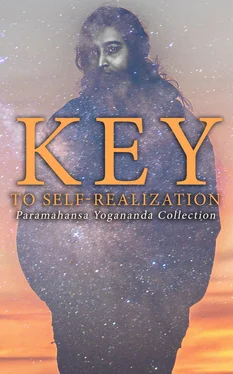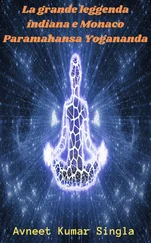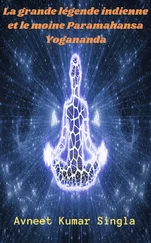1 ...8 9 10 12 13 14 ...26 "It was evident in all miracles performed by Lahiri Mahasaya that he never allowed the ego-principle 4-9 to consider itself a causative force. By perfection of resistless surrender, the master enabled the Prime Healing Power to flow freely through him.
"The numerous bodies which were spectacularly healed through Lahiri Mahasaya eventually had to feed the flames of cremation. But the silent spiritual awakenings he effected, the Christlike disciples he fashioned, are his imperishable miracles."
I never became a Sanskrit scholar; Kebalananda taught me a diviner syntax.
4-1:Literally, "renunciate." From Sanskrit verb roots, "to cast aside."
4-2:Effects of past actions, in this or a former life; from Sanskrit kri , "to do."
4-3: Bhagavad Gita , IX, 30-31. Krishna was the greatest prophet of India; Arjuna was his foremost disciple.
4-4:I always addressed him as Ananta-da. Da is a respectful suffix which the eldest brother in an Indian family receives from junior brothers and sisters.
4-5:At the time of our meeting, Kebalananda had not yet joined the Swami Order and was generally called "Shastri Mahasaya." To avoid confusion with the name of Lahiri Mahasaya and of Master Mahasaya ( chapter 9), I am referring to my Sanskrit tutor only by his later monastic name of Swami Kebalananda. His biography has been recently published in Bengali. Born in the Khulna district of Bengal in 1863, Kebalananda gave up his body in Benares at the age of sixty-eight. His family name was Ashutosh Chatterji.
4-6:The ancient four Vedas comprise over 100 extant canonical books. Emerson paid the following tribute in his Journal to Vedic thought: "It is sublime as heat and night and a breathless ocean. It contains every religious sentiment, all the grand ethics which visit in turn each noble poetic mind. . . . It is of no use to put away the book; if I trust myself in the woods or in a boat upon the pond, Nature makes a Brahmin of me presently: eternal necessity, eternal compensation, unfathomable power, unbroken silence. . . . This is her creed. Peace, she saith to me, and purity and absolute abandonment- these panaceas expiate all sin and bring you to the beatitude of the Eight Gods."
4-7:The seat of the "single" or spiritual eye. At death the consciousness of man is usually drawn to this holy spot, accounting for the upraised eyes found in the dead.
4-8:The central sacred figure of the Sanskrit epic, Ramayana .
4-9:Ahankara, egoism; literally, "I do." The root cause of dualism or illusion of maya , whereby the subject (ego) appears as object; the creatures imagine themselves to be creators.
CHAPTER: 5
A "Perfume Saint" Displays His Wonders
Table of Contents
"To every thing there is a season, and a time to every purpose under the heaven."
I did not have this wisdom of Solomon to comfort me; I gazed searchingly about me, on any excursion from home, for the face of my destined guru. But my path did not cross his own until after the completion of my high school studies.
Two years elapsed between my flight with Amar toward the Himalayas, and the great day of Sri Yukteswar's arrival into my life. During that interim I met a number of sages-the "Perfume Saint," the "Tiger Swami," Nagendra Nath Bhaduri, Master Mahasaya, and the famous Bengali scientist, Jagadis Chandra Bose.
My encounter with the "Perfume Saint" had two preambles, one harmonious and the other humorous.
"God is simple. Everything else is complex. Do not seek absolute values in the relative world of nature."
These philosophical finalities gently entered my ear as I stood silently before a temple image of Kali. Turning, I confronted a tall man whose garb, or lack of it, revealed him a wandering sadhu .
"You have indeed penetrated the bewilderment of my thoughts!" I smiled gratefully. "The confusion of benign and terrible aspects in nature, as symbolized by Kali, 5-1 has puzzled wiser heads than mine!"
"Few there be who solve her mystery! Good and evil is the challenging riddle which life places sphinxlike before every intelligence. Attempting no solution, most men pay forfeit with their lives, penalty now even as in the days of Thebes. Here and there, a towering lonely figure never cries defeat. From the maya 5-2 of duality he plucks the cleaveless truth of unity."
"You speak with conviction, sir."
"I have long exercised an honest introspection, the exquisitely painful approach to wisdom. Self-scrutiny, relentless observance of one's thoughts, is a stark and shattering experience. It pulverizes the stoutest ego. But true self-analysis mathematically operates to produce seers. The way of 'self-expression,' individual acknowledgments, results in egotists, sure of the right to their private interpretations of God and the universe."
"Truth humbly retires, no doubt, before such arrogant originality." I was enjoying the discussion.
"Man can understand no eternal verity until he has freed himself from pretensions. The human mind, bared to a centuried slime, is teeming with repulsive life of countless world-delusions. Struggles of the battlefields pale into insignificance here, when man first contends with inward enemies! No mortal foes these, to be overcome by harrowing array of might! Omnipresent, unresting, pursuing man even in sleep, subtly equipped with a miasmic weapon, these soldiers of ignorant lusts seek to slay us all. Thoughtless is the man who buries his ideals, surrendering to the common fate. Can he seem other than impotent, wooden, ignominious?"
"Respected Sir, have you no sympathy for the bewildered masses?"
The sage was silent for a moment, then answered obliquely.
"To love both the invisible God, Repository of All Virtues, and visible man, apparently possessed of none, is often baffling! But ingenuity is equal to the maze. Inner research soon exposes a unity in all human minds-the stalwart kinship of selfish motive. In one sense at least, the brotherhood of man stands revealed. An aghast humility follows this leveling discovery. It ripens into compassion for one's fellows, blind to the healing potencies of the soul awaiting exploration."
"The saints of every age, sir, have felt like yourself for the sorrows of the world."
"Only the shallow man loses responsiveness to the woes of others' lives, as he sinks into narrow suffering of his own." The SADHU'S austere face was noticeably softened. "The one who practices a scalpel self-dissection will know an expansion of universal pity. Release is given him from the deafening demands of his ego. The love of God flowers on such soil. The creature finally turns to his Creator, if for no other reason than to ask in anguish: 'Why, Lord, why?' By ignoble whips of pain, man is driven at last into the Infinite Presence, whose beauty alone should lure him."
The sage and I were present in Calcutta's Kalighat Temple, whither I had gone to view its famed magnificence. With a sweeping gesture, my chance companion dismissed the ornate dignity.
"Bricks and mortar sing us no audible tune; the heart opens only to the human chant of being."
We strolled to the inviting sunshine at the entrance, where throngs of devotees were passing to and fro.
"You are young." The sage surveyed me thoughtfully. "India too is young. The ancient rishis 5-3 laid down ineradicable patterns of spiritual living. Their hoary dictums suffice for this day and land. Not outmoded, not unsophisticated against the guiles of materialism, the disciplinary precepts mold India still. By millenniums-more than embarrassed scholars care to compute!-the skeptic Time has validated Vedic worth. Take it for your heritage."
As I was reverently bidding farewell to the eloquent sadhu , he revealed a clairvoyant perception:
Читать дальше












